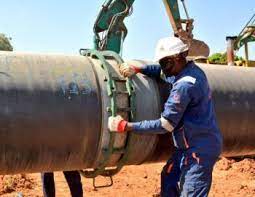Nigeria and Morocco have officially kicked off the implementation of the 5,600 kilometres Gas Pipeline (NMGP) Project following the signing of the Memorandum of Understanding (MoU) on Thursday in Rabat.
The gas pipeline project is going to be world’s longest offshore pipeline covering about 5,600 kilometres and traversing 13 African countries.
The deal was sealed by Nigeria National Petroleum Corporation Limited (NNPCL), Morocco’s Office National des Hydrocarbures et des Mines (ONHYM) and the Economic Community of West African States (ECOWAS).
The NNPCL, ONHYM and ECOWAS have today, signed an MoU in Rabat, Morocco to kick off the Project.
When completed, it is expected to provide three billion standard cubic feet of gas per day (3bscfd)gas from Nigeria to the West African countries through to the Kingdom of Morocco and subsequently to Europe.
The countries are the West African Coast from Nigeria, Benin, Togo, Ghana, Cote d’Ivoire, Liberia, Sierra Leone, Guinea, Guinea Bissau, Gambia, Senegal and Mauritania to Morocco.
Mr Mele Kyari, Group Chief Executive Officer of NNPC Ltd, signed the MoU on behalf of Nigeria, while Amina Benkhadra, Director General of Morocco’s National Office for Hydrocarbons & Mines (ONHYM) signed on behalf of her country.
Mr Sediko Douka, the ECOWAS Commissioner for Infrastructure, Energy and Digitalization signed on behalf of the sub-regional organisation.
Kyari described the project as a very important milestone in which all key stakeholders have come together to reaffirm their commitment.
Nigeria and Morocco, he explained stand to benefit immeasurably from the execution of the project which extends beyond the supply of gas to energize the countries along the route.
“Some of the benefits include the creation of wealth and improvement in the standard of living, integration of the economies within the region, mitigation against desertification and other benefits that will accrue as a result of a reduction in carbon emission,” Kyari added.
NNPC would facilitate the continuous supply of gas and provide other enablers such as the required land for the first compressor station for the pipeline to be deployed in Nigeria which is among the thirteen stations earmarked along the pipeline route, he said.
The corporation, “is well positioned to implement the project by leveraging its experience and technical capabilities ranging from gas production, processing, transmission and marketing as well as its vast experience in executing major gas infrastructure projects in Nigeria’’.
The Nigeria-Morocco Gas Project (NMGP) was initiated when King Mohammed VI of Morocco visited Nigeria in December 2016.
It is aimed at monetizing Nigeria’s abundant natural gas resources, thereby generating additional revenue for the Country, diversifying Nigeria’s gas export routes and eliminating gas flaring in the country.
The pipeline will originate from Brass Island (Nigeria) and terminates in the North of Morocco, where it will be connected to the existing Maghreb European Pipeline (MEP) that originates from Algeria (via Morocco), all the way to Spain.
According to NNPC, the pipeline is a 48-inch X 5,300km (Offshore from Brass Island-Nigeria to Dakhla-Morocco) and 56” X 1,700km (onshore from Dakhla-Morocco to MEP), with a total length of about over 7,000km and about 13
Compressor Stations.
The road to the implementation of NMGP had started in Nigeria with construction of Ajaokuta-Kaduna-Kano pipeline that was conceived to facilitate the Trans-Sahara Gas Project (TSGP)
Nigeria has already kicked off the first phase of the proposed TSGP, with the laying of pipes running from Warri through Ajaokuta, Kaduna to North West Kano state named AKK.
The Nigeria’s segment, $2.8 billion AKK pipeline, is a 614km-long pipeline being developed by NNPC to transport natural gas from southern Nigeria to Northern Nigeria.
Nigeria holds Africa’s biggest gas reserves, with natural gas reserves of 188 trillion cubic feet (tcf) comprising 99tcf of associated gas and 89tcf of non-associated gas.




